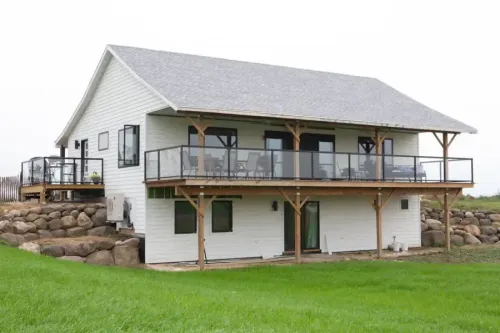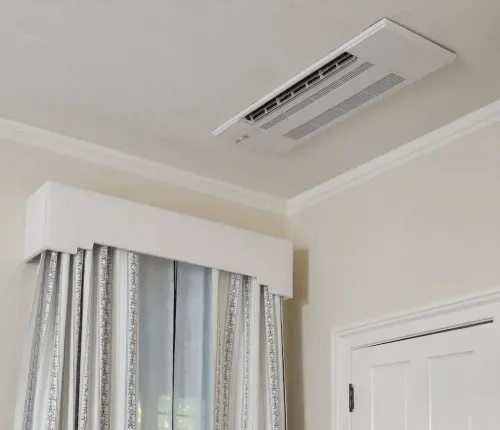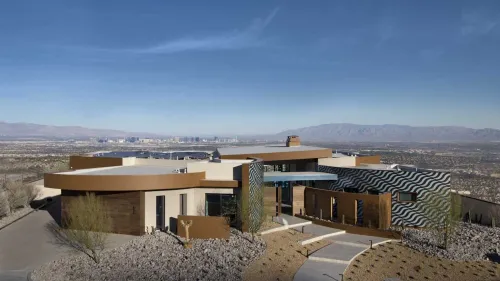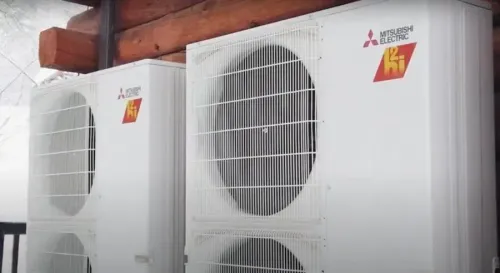Project Location: Castle Rock, Colorado
Completion Date: July 2016
Challenge
Selecting an energy-efficient HVAC system that provides year-round comfort for a new, Class A office buildingSolution
Mitsubishi Electric VRFResult
Zoning capabilities and reliable performance – even during fluctuating outdoor temperatures
Just 30 miles south of Colorado’s state. capital, tucked away in the Colorado Mountains, sits the community of Castle Rock. With a little more than 56,000 residents, Castle Rock prides itself on its small-town charm, historic downtown, small businesses and community involvement. Over the past few years, business population began to grow exponentially, and shortly thereafter, office space quickly became limited. To prevent local businesses from moving, the town and the Castle Rock Economic Development worked together to propose a new office building called The Move – a name that symbolized how businesses wouldn’t have to move outside of city limits to expand. The town decided on a 50,000-square-foot, four-story building to house businesses from fast-growing industries like marketing, food auditing and general contracting. To keep businesses productive and comfortable in the new workspace, the project team wanted a quiet and reliable HVAC system that could meet tenant needs throughout the entire year. The solution was Variable Refrigerant Flow (VRF) systems with Hyper-Heating INVERTER® (H2i®) technology from Mitsubishi Electric.
Doug Decker, vice president, White Construction Group, Castle Rock – one of the building’s owners and the general contractor on the job – knew his team had a challenge in finding an HVAC system that would meet everyone’s needs. He said, “We needed a system that was energy-efficient, offered zone control and operated quietly.” Decker also pointed out how the project team included energy-efficient elements in the building’s design, so they wanted the new HVAC system to be efficient as well. He said, “Our first priority was to find a system that was energy-efficient because we have solar panels on the building.” Decker and the project team originally planned to install traditional HVAC technology, but with the assistance of local contracting company, Conditioned Air Corporation, Castle Rock, they decided to look into VRF.
John Godshalk, principal, Conditioned Air Corporation, knew VRF would stand up to Colorado’s constantly fluctuating temperatures. He said, “Solar exposure varies throughout the day, and a nice aspect of this system is the simultaneous cooling and heating capability and the redistribution of heat energy within the building envelope.”
Decker and his team were interested in VRF, but needed to ensure their budget could handle a different system than the one originally planned. After comparing VRF’s lifecycle costs against that of the planned system, they agreed that VRF’s efficiency would allow the building owners to save money over time.
With VRF identified as the preferred technology, Godshalk recommended that Decker select Mitsubishi Electric VRF with H2i because of its design flexibility. “Mitsubishi Electric is a leader in this technology. They have a two-pipe system while other competitors have three. Mitsubishi Electric also leads this technology because of the flexibility of their system design. Their VRF allows for easy remodels down the road.” Decker agreed with Godshalk’s recommendation, and said, “We also chose Mitsubishi Electric because we didn’t have to do vertical duct penetration.” Finally, the H2i technology would ensure that occupants remain comfortable during even the coldest months of the year.
Decker contracted Bryan Moen, Pe, Moen Engineering Consultants, Westminster, Colorado, to design the system. Moen said, “Although we had not used VRF before, we were excited for the opportunity to utilize VRF on this project. We liked the idea of working with Mitsubishi Electric on the project because we were familiar with their ductless split. system products.” The design Moen developed involved installing 116 tons of VRF – nine outdoor units on the roof that would serve 57 indoor units. Moen said, “The installation process was efficient and we didnot encounter any issues during construction.” Godshalk added, “We received great overall support from local technicians and the distributor, Charles D. Jones Company. We were able to rely on them for the project; they’re really committed to this product line from Mitsubishi Electric.”
Since installation, the VRF system has proven to be very reliable. “When we started the system up, we didn’t have any hiccups, and there were no glitches with any system components. The tenants have had 100 percentcomfort since then,” said Godshalk.
As a partial owner and now one of the tenants in The Move, Decker was pleased with the system’s performance within the first two months and believes it’s been successful in keeping other tenants comfortable too. “So far, we like the system. It’s been active since the first of August, and we’ve already had some cold weather here. The system has been keeping up!”
Godshalk has also appreciated the system’s zoning capabilities – specifically, how the system has allowed the building to have more finite control through Mitsubishi Electric’s Ae-200A Centralized Controller.
He said, “The best part about the Ae-200A is that it allows block scheduling for zones and has the. ability to be remotely monitored. They can schedule simultaneous cooling and heating for two offices that are side-by-side.” He also mentioned the system’s operation: “The system will run down to about four percent of capacity; traditional rooftop units will not do that. But the VRF system’s compressors will vary their speed to whatever the capacity is based on the current demand. They’re constantly modulating. And there aren’t tenant complaints of it being too hot or too cold. The system has been running beautifully, and everyone is happy.”
The Move has been an overall success, providing local business with a place to generate new ideas and promote company growth, but also providing a workplace that’s conveniently close to home. Decker said, “We didn’t want to move out of the town of Castle Rock. Businesses are expanding and growing, and we needed a new, innovative space.” With Mitsubishi Electric VRF, that space is now a reality.
Project Team
- Owner: White Construction Group and The Move Llc, Castle Rock, Colorado
- Architect: Barker Rinker Seacat Architecture, Denver, Colorado
- HVAC Engineer: Moen Engineering Consultants, Westminister, Colorado
- HVAC Contractor: Conditioned Air Corporation, Castle Rock, Colorado
- Distributor: Charles D. Jones Company, Denver, Colorado
Mitsubishi Electric Equipment Installed
- (9) PURY R2-Series Outdoor Units
- (6) PEFY Ceiling-concealed Ducted Indoor Units
- (52) PLFY 4-Way Ceiling Cassette Indoor Units
- (1) Ae-200A Centralized Controller
- (2) Ae-50A Expansion Controllers
- (9) Cmb Bc Controllers









